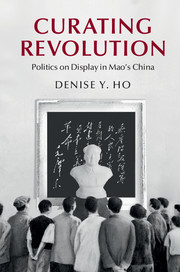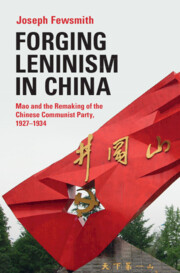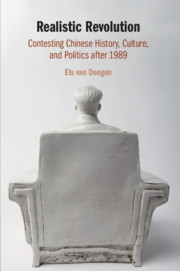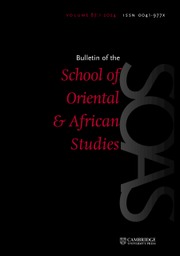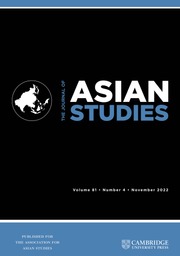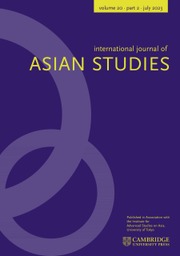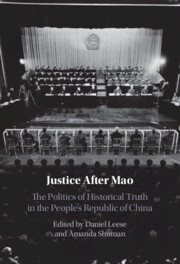
Justice After Mao
The Politics of Historical Truth in the People's Republic of China
$130.00 (F)
- Editors:
- Daniel Leese, University of Freiburg
- Amanda Shuman, University of Freiburg
- Date Published: September 2023
- availability: Available
- format: Hardback
- isbn: 9781009261296
$
130.00
(F)
Hardback
Other available formats:
eBook
Looking for an examination copy?
This title is not currently available for examination. However, if you are interested in the title for your course we can consider offering an examination copy. To register your interest please contact [email protected] providing details of the course you are teaching.
-
How can a dictatorship cope with the legacy of injustices and atrocities committed in its own name? This was one of the pressing questions the Chinese Communist Party leadership faced after the death of Mao Zedong in September 1976 and the end of the Cultural Revolution. This collection presents ground-breaking, original research to address the question of historical justice in the Party's attempt to survive politically despite rampant factionalism and widespread political persecution. The volume traces complex questions of property restitution, fostering reconciliation within local communities, and establishing new standards of truth. Contributions also investigate how various actors remember the period in the present. The post-Mao period provides a lens through which to view strategies of coping with a violent past under state socialism, highlighting how selectively applied approaches now associated with the concept of transitional justice may even serve to strengthen rather than subvert authoritarian rule.
Read more- Relies on previously untapped sources to provide a fresh perspective on the uses and abuses of history and justice after Mao Zedong's death
- Presents completely new perspectives on a period that is crucial for understanding modern Chinese history
- Invites interdisciplinary comparison of transitional justice attempts in other authoritarian contexts
Reviews & endorsements
'In the aftermath of the Cultural Revolution, a regime that was responsible for millions of deaths attempted to ‘bring order out of chaos’ by carefully, quietly, and systematically reckoning with the traumas of the Mao Zedong years. Leese and Shuman have assembled an all-star team of authors whose chapters sparkle with gripping intensity, showing how an authoritarian system's attempts to offer justice and compensation have strengthened single-party rule while exacerbating and prolonging some survivors' fears and traumas. Full of penetrating insights based on deep readings of rare sources, this book pushes the field of the history of the People's Republic of China to a new level.' Jeremy Brown, Simon Fraser University
See more reviews'This groundbreaking volume unveils a riveting and previously unexplored dimension of modern Chinese history, delving into the complexities of addressing past injustices without formal political transitions. The meticulous research, combined with fresh, cross-disciplinary perspectives, creates an intellectual tour de force. A must-read for anyone interested in the intersection of politics, history, and justice.' Yiching Wu, University of Toronto
'This volume offers the most rigorous and illuminating work to date on what it meant to reevaluate truth, redress injustice, and reimagine the future in China’s transition from revolution to reform. An astounding archive of grassroots sources link the local and the national in a compelling story about people coming to terms with the past.' Aminda M. Smith, Michigan State University
'China’s post-Mao transition began with a dramatic shift in elite politics, but it led to an intensive and sustained mass campaign of restitution, rehabilitation, and truth-telling. This volume illuminates this neglected side of China’s recovery from Maoism, through which the Communist Party addressed the wreckage wrought by the Cultural Revolution and rebuilt its capacity to rule. This is a major contribution to our understanding of what may be the most important turning point in the history of the PRC.' Andrew G. Walder, Stanford University, author of China Under Mao
'This deftly edited volume brings into sharp focus critical issues concerning regime legitimacy in post-Mao China. The essays draw on diverse sources to shed new light on the multifaceted dimensions of state-society negotiations, in humanistic terms, over historical injustice. This important book advances paradigm-shifting perspectives both about transitional justice and post-Mao China.' Wen-hsin Yeh, Richard H. & Laurie C. Morrison Chair and Distinguished Professor of History, University of California, Berkeley
‘Drawing on a rich archive of primary materials in the Maoist Legacy Project and engaging Chinese scholarship, Leese’s and Shuman’s collection of studies changes not only how we understand the Mao period and how Chinese high and low recovered from it, but also how we understand ’transitional justice.’ A model of international scholarship.’ Timothy Cheek, The University of British Columbia
'In the aftermath of the Cultural Revolution, China’s newly installed Party authorities found the need to create a new discursive environment to enable their modernization drive. With the reformist discourse of ‘socialist rule of law’ now replacing Maoist revolutionary justice, many thousands of victims of Cultural Revolution persecution were rehabilitated in the period beginning 1979 to the mid-1980s. This important collection of studies on redressing Cultural Revolution injustices sheds much needed light on this significant time in China’s recent history. Its main contribution is not only that it provides, for the first time in book length form, an insight into the minutiae of the rehabilitation campaign. It also helps us to understand how the Party sought to correct its own wrongs in ways that worked to uphold - rather than undermine - the very institutional structures of power that facilitated the Cultural Revolution chaos.' Susan Trevaskes, Griffith University
Customer reviews
Not yet reviewed
Be the first to review
Review was not posted due to profanity
×Product details
- Date Published: September 2023
- format: Hardback
- isbn: 9781009261296
- length: 357 pages
- dimensions: 235 x 159 x 23 mm
- weight: 0.63kg
- availability: Available
Table of Contents
Introduction Daniel Leese and Amanda Shuman
Part I. Property:
1. Between revolution and law: Merchant families' struggles for property rights and justice under Mao and Deng, 1949–1984 Zhaojin Zeng
2. What right to property when rebellion is justified? Revolution and restitution in Shanghai Puck Engman
3. The pursuit of transitional justice from below: A case study from Shanghai Qin Shao
Part II. The Mechanics of Rehabilitation:
4. Dealing with victims of the Cultural Revolution: The case of the Guangxi killings, 1983–1987 Guoqing Song
5. Villagers, cadres, and the politics of rehabilitation in post-Mao China, 1979–1982 Long Yang
Part III. The Politics of Truth:
6. Local reassessment versus central prestige: Tao Zhu, land reform, and the Pine Hill incident Mark Czeller
7. New verdicts on the printed page: Expurgating the ,Gang of Four, in the publishing industry, 1976–1978 Matthew Wills
Part IV. Memory:
8. Narratives and voices of Cultural Revolution ,perpetrators, Man Zhang
9. Coping with a traumatic past: Wang Bing's documentaries He Fengming and Dead Souls Flora Lichaa
10. From individual guilt to public remorse: The ,Confessions, (Chanhuilu) column in the journal Yanhuang Chunqiu Sebastian Veg
Afterword: The Chinese Communist Party's politics of historical justice in perspective Daniel Leese.
Sorry, this resource is locked
Please register or sign in to request access. If you are having problems accessing these resources please email [email protected]
Register Sign in» Proceed
You are now leaving the Cambridge University Press website. Your eBook purchase and download will be completed by our partner www.ebooks.com. Please see the permission section of the www.ebooks.com catalogue page for details of the print & copy limits on our eBooks.
Continue ×Are you sure you want to delete your account?
This cannot be undone.
Thank you for your feedback which will help us improve our service.
If you requested a response, we will make sure to get back to you shortly.
×

